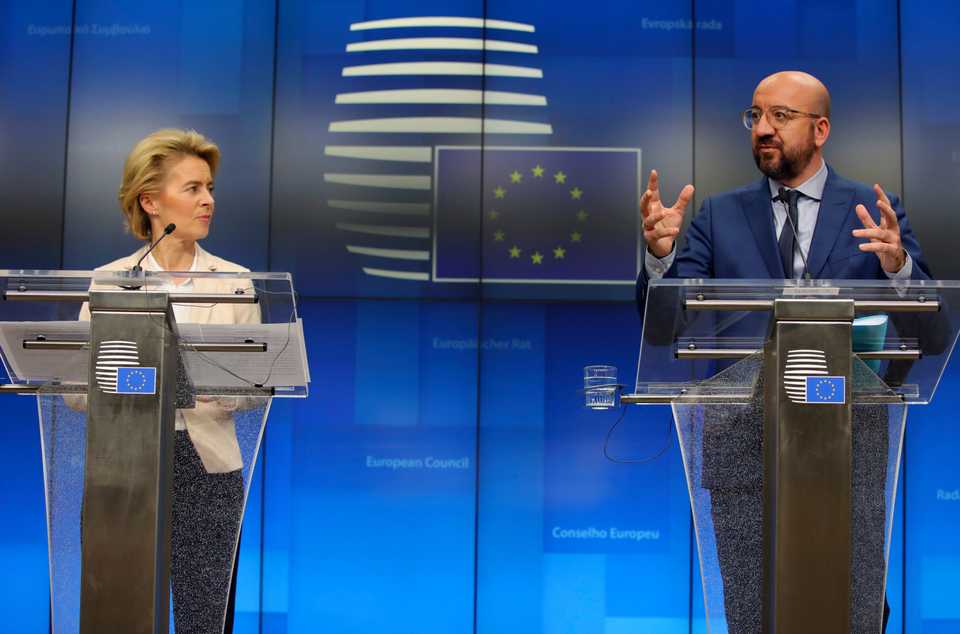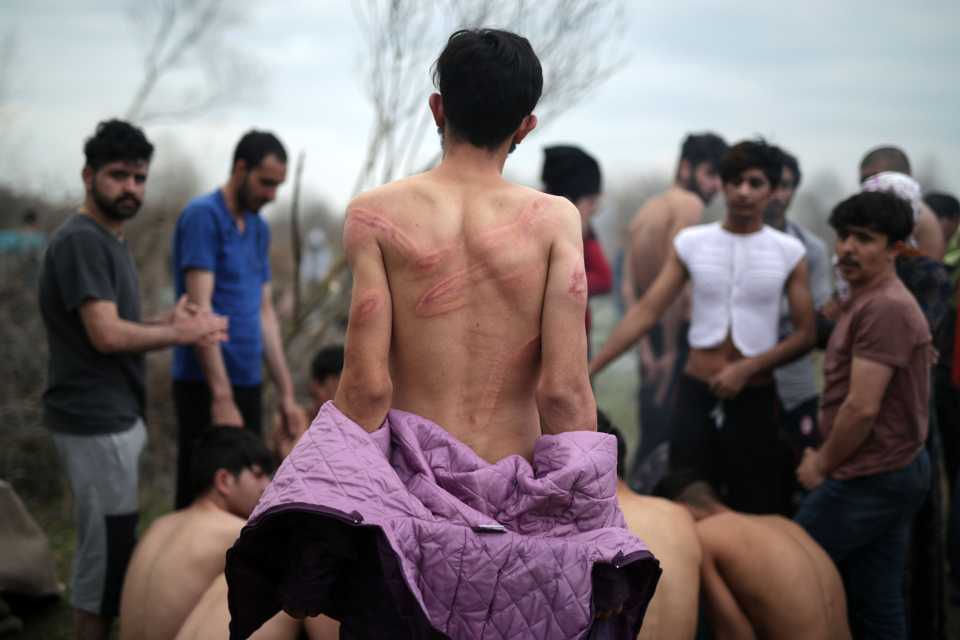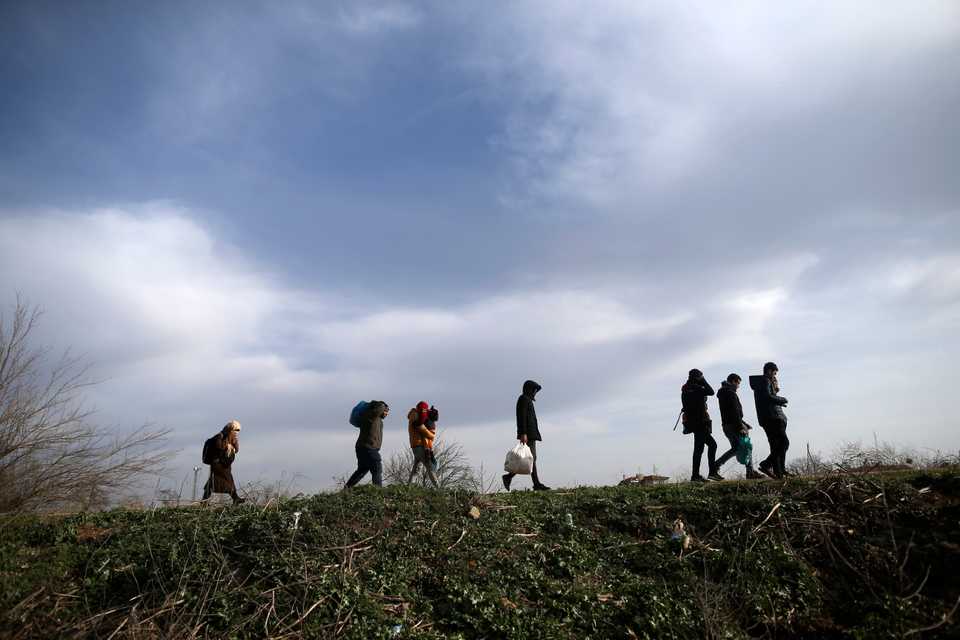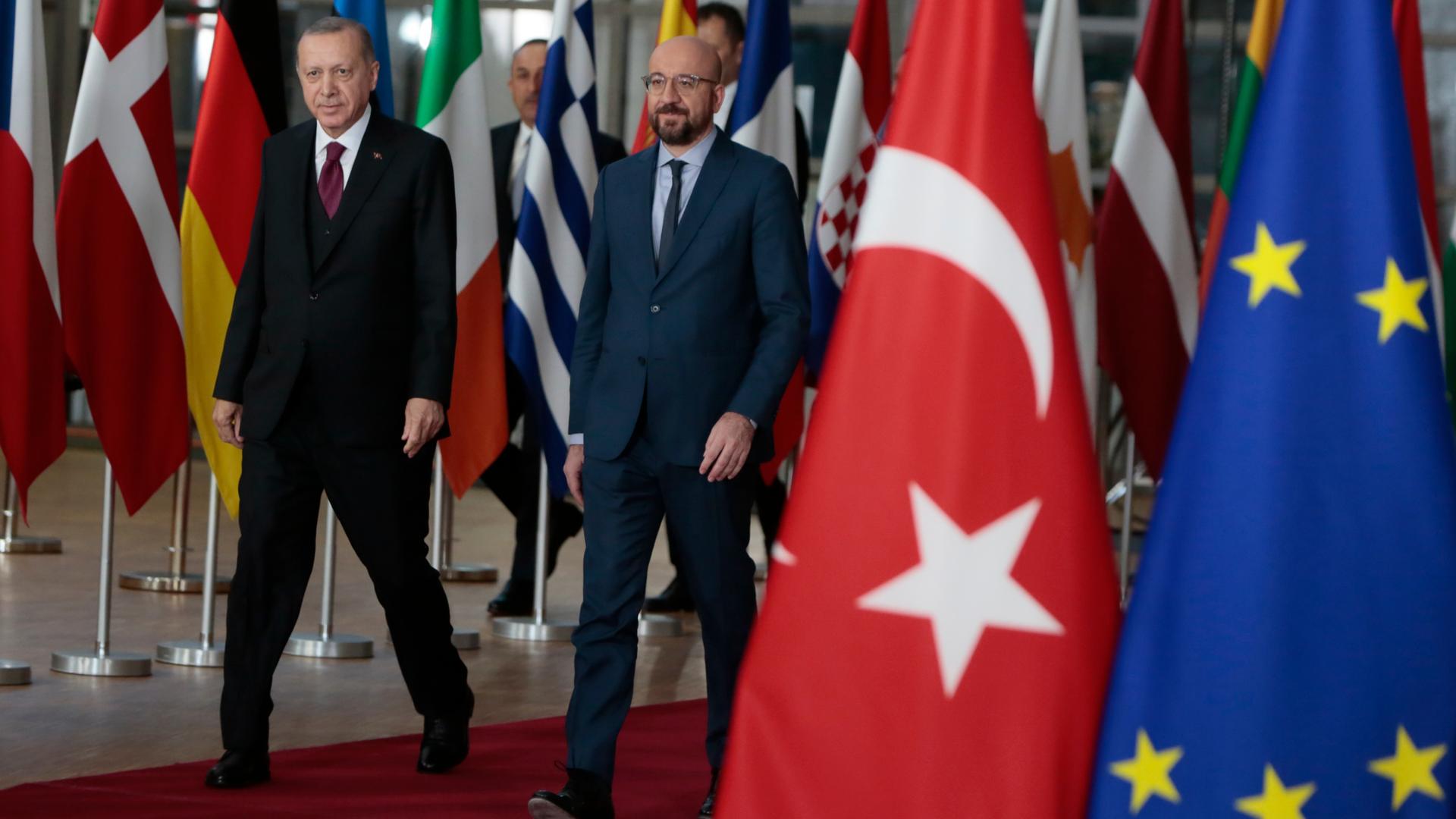After chaos gripped the Turkish-Greek border for two weeks, with hordes of refugees trying to cross over to reach various European cities, the leaders of the European Union and Turkey are in talks to draft a new refugee deal.
After meeting the EU leadership on Monday, Turkish President Recep Tayyip Erdogan said both sides “can start a new process” despite having disagreements in the past.
Selim Kuneralp, a former Turkish diplomat, told TRT World that if both sides succeed in ending the standoff at the Turkey-Greece border in a quiet manner, the possibility of a new agreement becomes real.
Kuneralp has been a career diplomat with an extensive understanding of Turkey-EU relations, being Ankara’s former ambassador to the EU. He also led Turkish foreign ministry’s EU directorate during his time in Ankara.
The border between Turkey and Greece recently witnessed chaotic scenes after Ankara opened up its borders. Scores of refugees showed up to cross over, sending waves of panic across Europe, as Greek soldiers used brute force, at least killing four migrants, to keep the new arrivals away from their border. Ankara’s act was a clear warning to the world that a refugee influx of massive proportions could not be Turkey’s problem alone and Western nations must step up to share the burden.
“The content of the agreement might be a little different from the 2016 deal. Because of the rise of the far-right across Europe, the EU does not want to receive refugees, possibly offering more aid to Turkey,” Kuneralp said while talking to TRT World.
“If a new refugee deal comes into force, it might start a new chapter between Turkey and the EU, opening a new path. Even a limited agreement with the EU could be introduced as a new beginning, gaining more time and creating a positive atmosphere.”
The EU has not made a clear statement about what exactly the bloc thinks on developing a new deal, but stated that the talks are continuing anyway.
“Clearly we do have our disagreements, but we have spoken plainly and we have spoken openly to each other,” President of the European Commission Ursula von der Leyen told reporters after the talks, indicating that the tense discussions might pave the way for a constructive process.

The background
A few days ago, Erdogan was in Brussels where he asked the EU leadership to update the 2016 refugee deal. This came against the backdrop of recent Idlib escalation, in which Turkish forces dealt a massive blow to the Syrian regime and subsequent discussions with Russian President Vladimir Putin in Moscow in early March. After intense discussions, the two leaders agreed to call for another ceasefire and gave reassurances to each other that violence must end in Idlib in order to stop — if not reverse — the refugee crisis. It remains to be seen how far Putin can control the Assad regime, which recently carried out a brutal bombing campaign in the region, forcing nearly a million people to flee to the Turkish border.
The growing refugee debacle from Turkey’s southern borders to its western frontiers is primarily a result of the brutal nine-year Syrian civil war and the Syrian regime’s bloodlust to take over Idlib, the last opposition stronghold. It has the potential to create another major wave of refugees knocking at the doors of Europe.
“Europe’s borders do not start at the Turkey-Greece border. Europe’s borders start from Turkey’s southern and eastern frontiers,” said Turkey’s Foreign Minister Mevlut Cavusoglu on Tuesday, after having discussions with the EU leaders, reminding them that what happens in Idlib and elsewhere is not only Ankara’s problem.

“While you say no migration [from Idlib], you do not provide any support to people [refugees] to live here [in Turkey]. Today’s conditions are different from 2016’s migrant needs. We will discuss with the EU issues concerning what we can do about refugees under the framework of new conditions,” Cavusoglu said.
Turkey hosts nearly four million refugees, spending billions of dollars since the beginning of the Syrian civil war in 2011.
In 2016, Turkey and the EU reached a refugee agreement, to which Ankara agreed to keep refugees in its borders in return for promised aid that amounted to six billion euros and holding talks to improve mutual relations.
On his return to Turkey from Brussels, Erdogan announced that Istanbul will host German and French leaders next week for a refugee summit to possibly lay the ground for a new agreement. Britain’s Boris Johnson might also join, he told journalists on his plane.
If Turkey, Germany and France agree on a common agenda in Istanbul to address the growing refugee problem, then it will be possible to update the 2016 deal in the upcoming EU leaders’ summit on March 26, according to the Turkish foreign minister.

While engaging in tough negotiations with European Council President Charles Michel and von der Leyen, Erdogan appears to be in an optimistic mood for the new deal.
“We have taken many steps in that regard and will continue to do so. If the EU also shows this determination and political vision, we will be able to go far,” Erdogan said.
German Chancellor Angela Merkel gave an optimistic response to the prospect of a new refugee deal before Erdogan’s meeting with the EU leaders.
“We have to eliminate the root causes of migration… That was the main philosophy of the EU-Turkey agreement. I have been advocating for that since 2015, and I will continue to do so in the future,” Merkel said.
“I would make every effort to bring the EU-Turkey agreement to a new level,” the German leader promised.
Turkey expects the EU to fulfill its responsibilities
According to the 2016 deal, the EU promised to improve relations with Turkey and help alleviate its refugee burden. But much of it has not been realised, angering Turkey.
“The EU presidents have accepted that while Turkey has fulfilled its responsibilities concerning the 2016 agreement, the EU has been slow to fulfill [its responsibilities],” Erdogan said.
“In order to speed up the process, a joint study will be conducted as technical and political teams will lay out a road map. We suppose that these works will produce their first results until the EU leaders’ summit on March 26,” the Turkish president added.
Erdogan has also indicated that Turkey-EU relations might resume if the European leaders are able to see the big picture on various issues ranging from energy to fighting against terrorism, migration, the refugee crisis and security.
On all these issues, both sides “need collaboration and cooperation”, Erdogan said.










Discussion about this post